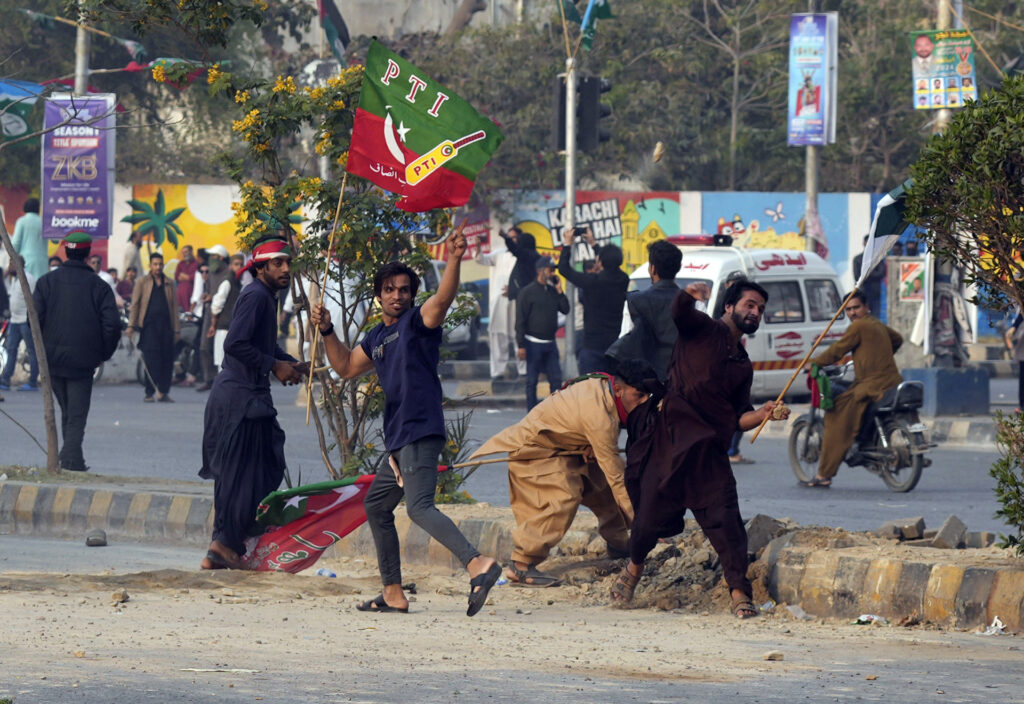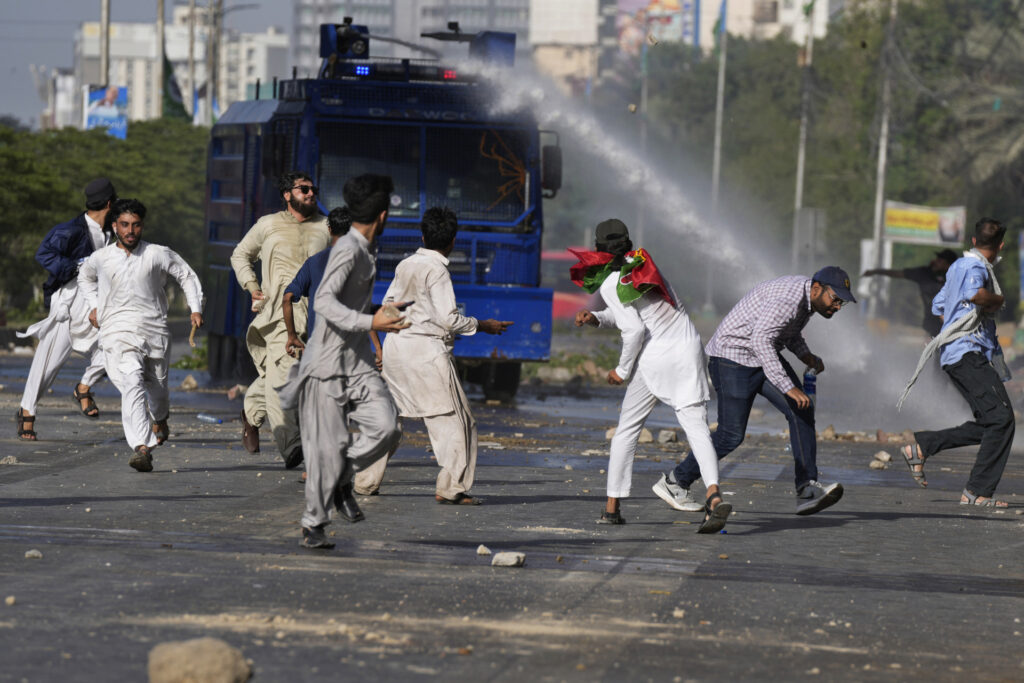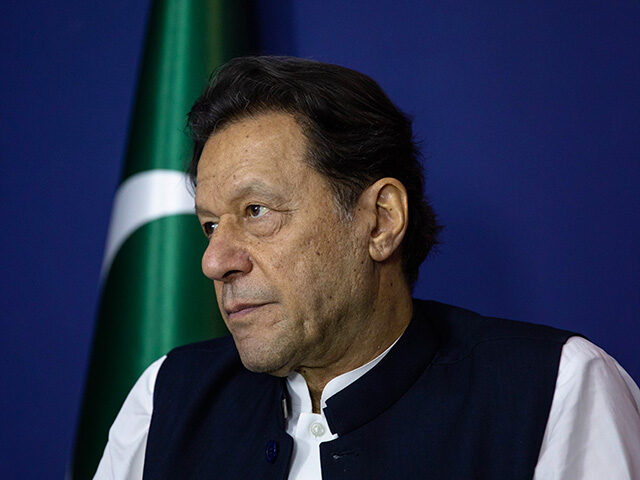Former Pakistani Prime Minister Imran Khan, already jailed on corruption charges, was sentenced to another ten years in prison on Tuesday for mishandling security documents.
The new conviction comes just nine days before the Pakistani election, in which Khan would likely be the frontrunner for prime minister if he were not in jail.
Khan was sentenced by a special court convened under Pakistan’s Official Secrets Act to prosecute the “Cipher Case,” which concerns the handling of a diplomatic document that became somewhat infamous in its own right in the summer of 2023.
The secret diplomatic cable detailed a March 2022 meeting between Pakistan’s then-ambassador to the United States, Asad Majeed Khan, and U.S. State Department officials. According to Ambassador Khan, the State Department was furious at Prime Minister Khan’s position on the Russian invasion of Ukraine and made it clear it would like to see someone else in the prime minister’s office.
“I think if the no-confidence vote against the Prime Minister succeeds, all will be forgiven in Washington because the Russia visit is being looked at as a decision by the Prime Minister. Otherwise, I think it will be tough going ahead,” Assistant Secretary of State Donald Lu told Ambassador Khan.
The no-confidence vote did, indeed, succeed the following month, making Imran Khan the first Pakistani prime minister to be dislodged with such a measure. Khan angrily pointed to the diplomatic cable as proof that his ouster was a foreign plot orchestrated by the United States.
The authenticity of the Cipher Case cable remains in dispute, with the State Department insisting the Biden administration had no position on who the prime minister of Pakistan should be, whatever the cable might say.
The Pakistani special court ruled that Khan and former Foreign Minister Shah Mahmood Qureshi mishandled the Cipher Case document, sentencing both to ten years in prison.
Khan was accused of displaying the diplomatic cable at a political rally in March 2022 — before the no-confidence vote that booted him from office — and claiming it was proof that a foreign conspiracy was out to get him. Qureshi, a senior leader in Khan’s Pakistan Tehreek-e-Insaf (PTI) Party, was also accused of revealing a secret government document to gain political advantage. Both claimed they did not know what happened to the cipher after it disappeared from Khan’s office.
Khan had already been banned from running for office for five years by Pakistan’s election commission. Qureshi, like Khan, was already in jail but had been allowed to run for a seat in the legislature until Tuesday’s ruling, which barred him from running for office.
Khan claimed the ruling was part of a vengeful conspiracy between the Pakistani military and foreign powers to keep him from returning to office. His sister, Aleema, implied that hostile forces were “giving instructions” to the judge, who rushed through the trial before U.S. officials or Pakistani military leaders could be called to testify.
PTI denounced the special court as a “sham trial” and a “complete mockery and disregard of the law.” Khan’s party urged its voters to turn out on February 8 and predicted Tuesday’s ruling would be thrown out on appeal.
“Do not get angry; don’t take the law in your hands. You do not have to throw a single stone; you should show patience,” added PTI leader Gohar Khan.
Tens of thousands of Khan’s supporters held rallies across the country on Sunday, even though the government forbade them from demonstrating. Police in Pakistan’s largest city, Karachi, dispersed demonstrators with tear gas and batons, arresting dozens of them. PTI responded by denouncing the crackdown as “one of the most shameful acts” taken by the sitting government to date.

Supporters of former Prime Minister Imran Khan and the Pakistan Tehreek-e-Insaf (PTI) Paty clash with police during an election campaign rally in Karachi, Pakistan, on January 28, 2024. (AP Photo/Fareed Khan)
The interim government reportedly summoned dozens of journalists to PTI of running a “malicious social media campaign” against Pakistan’s Supreme Court, which ruled that PTI can no longer use its famous cricket bat logo, a symbol chosen in honor of Khan’s career as a star player.
Banning the logo was a massive blow to PTI because rural Pakistan has a large percentage of illiterate voters who tend to mark their ballots by looking for party symbols.
Information Minister Murtaza Solangi confirmed that “an investigation is underway” of the alleged effort to undermine the Supreme Court.
“An investigation is underway. We are monitoring hundreds of accounts, and action will be taken against them,” Solangi vowed.
The Human Rights Commission of Pakistan on Saturday denounced “escalating levels of censorship” by the caretaker regime, including “deliberate Internet outages to curtail digital assemblies.”
Despite all of this high drama, Al Jazeera News on Tuesday described the mood of the Pakistani electorate as “subdued,” with “little of the festive atmosphere that otherwise accompanies the campaign season.”
“This election has been rigged unlike any other in Pakistan’s history. It is nothing but a catharsis for the military for May 9 to have an election without Imran Khan and PTI. That is their bottom line,” an unnamed former federal minister grumbled to Al Jazeera.

Police use a water cannon to disperse supporters of Pakistan’s former Prime Minister Imran Khan protesting against the arrest of their leader in Karachi, Pakistan, on May 9, 2023. (AP Photo/Fareed Khan)
“May 9” was the day Khan’s supporters rioted across the country after he was arrested in a highly controversial paramilitary operation. The riots damaged some military property, prompting a stern warning from the military that such vandalism would not be tolerated again.

COMMENTS
Please let us know if you're having issues with commenting.